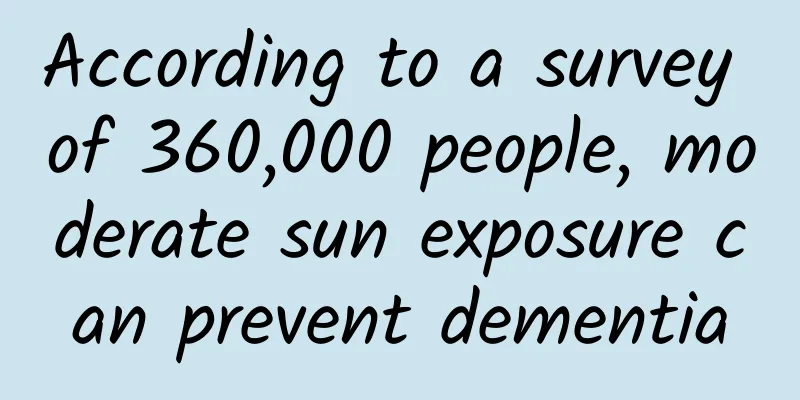According to a survey of 360,000 people, moderate sun exposure can prevent dementia

|
In fact, in the eyes of scientists, sunlight is not that scary. A new study shows that sunbathing is good for cognitive ability. Moderate sun exposure can prevent dementia Recently, a research team from Huashan Hospital affiliated to Fudan University and Qingdao Municipal Hospital affiliated to Qingdao University published a study in BMC Medicine, suggesting that moderate sun exposure can reduce the risk of dementia. The study included 362,094 adults from the UK Biobank, and during a median follow-up of nine years, 1.15% were diagnosed with dementia for the first time. Analysis shows that there is a J-shaped relationship between outdoor sunshine time and dementia risk. The risk of dementia is lowest when the average outdoor sunshine time is 1.5 hours per day, 2 hours per day in summer, and 1 hour per day in winter. When the average, summer, and winter daily outdoor sunshine time is shorter than the above-mentioned cut-off values, the risk of dementia increases by 18.4%, 18.2%, and 13.9%, respectively; when the daily outdoor sunshine time is longer than the above-mentioned cut-off values, the risk of dementia increases by 21%, 8.6%, and 24.2%, respectively. When the outdoor sunlight time is shorter, the risk of dementia increases significantly; while when the outdoor sunlight time is longer, the risk of dementia increases at a relatively slow rate. The association between outdoor sunlight time and dementia risk was stronger in people older than 60, women, and those who slept seven hours a night. The authors point out that this may be because sunlight promotes the synthesis of vitamin D and promotes brain health through multiple pathways. Sun exposure may also affect cognitive function by regulating circadian rhythms and the body's biological clock. Of course, outdoor sunlight should not be too much, otherwise it will increase diseases such as sunburn and skin cancer. What are the disadvantages of people who don't bask in the sun? Many studies have shown that proper sun exposure can help reduce the risk of cancer, heart disease, stroke, respiratory diseases, etc., and is also beneficial for stabilizing mood and improving hormone levels. People who don’t get enough sun exposure suffer the following four consequences. Osteoporosis 90% of the human body's vitamin D is synthesized through its own skin after being exposed to ultraviolet rays in sunlight. They can promote the absorption of calcium in the human body, thereby strengthening bones. Not seeing the sun for a long time can lead to vitamin D deficiency and increase the risk of osteoporosis. diabetes A study by the University of Malaga in Spain found that low vitamin D levels caused by insufficient sun exposure can increase the risk of obesity and type 2 diabetes. Depression When basking in the sun, the secretion of melatonin decreases, which can improve a person's mood and thus enhance the body's immunity. Otherwise, it is easy to become depressed and have a decreased resistance to disease. Less sun exposure will inhibit the production of serotonin, a "happy hormone" in the brain, and induce depression. Clinically, seasonal depression caused by shorter days and longer nights and less sunlight is very common. Multiple disease risks Insufficient sun exposure can also increase people's risk of heart disease, cognitive impairment, erectile dysfunction, prostate cancer, and mental illness; while getting more sun exposure can help prevent many cancers and common diseases such as allergies, asthma, myopia, influenza, and rickets. How to judge whether you need more sun exposure? If you answer "yes" to more than 3 of the following 5 questions, it means you should get some sun exposure. Do you apply all-round sun protection every day and cover yourself up particularly tightly? Do you spend most of your day indoors? Doesn’t the room face the sun? Would you rather stay at home on weekends? Do you have osteoporosis? How to know the right degree of sunbathing If you're concerned about getting a tan or increasing your risk of skin cancer, but still want to enjoy the health benefits of the sun, there are a few ways to minimize the negative effects. 1 time Try to avoid the time between 10 a.m. and 4 p.m., as this is the peak period for ultraviolet rays. Especially in the summer, the ultraviolet rays are too strong. Choose the morning and evening, and the time can be shortened to less than 15 minutes. If you want to find the best time of day to sunbathe, a good way to do it is to look at the shadow length: When the shadow is twice your height or even more, the UV index is the safest and you don’t need any protection and can just sunbathe. When the shadow is between 1 and 2 times the length of your body, it is safest to sunbathe for about 20 minutes. When the shadow is shorter than your height, UV rays may damage your skin within 30 minutes; If the shadow is less than half of your height, ultraviolet rays can damage your skin within 15 minutes. 2 crowd The sunbathing time for different groups of people can be slightly adjusted. Adults: The appropriate amount of sun exposure per day is 30 minutes to 1 hour. Infants and children: Because their skin is delicate, the sun exposure time can be shortened to 15 to 30 minutes. Elderly people: The ability to synthesize and utilize vitamin D is reduced, so the exposure time can be extended appropriately, but they should not be exposed to the sun for too long at one time. 3 Place Sunbathing through glass does not allow for sufficient ultraviolet light to penetrate, which is not conducive to the body's synthesis of vitamin D. It is best to go to an outdoor environment with good greenery and fresh air. In case of bad weather such as strong winds, you can stay at home and expose your plants to the sun near the glass. The effect will be better than not exposing them to the sun. 4 Location When sunbathing, in addition to the head, the limbs and back are also the focus. You can open your arms, palms facing the sun, imagine the sun shining all over your body, take deep breaths, and put your arms down when you feel tired. Repeat this action for 15 minutes, rub your hands and face to warm them up, and then take a walk. You can wear sunglasses to prevent glare. 5 food After sunbathing, you can drink some green tea, eat some fruits and vegetables rich in vitamin C, and appropriately supplement with foods rich in vitamin B3, such as animal liver, chicken breast, salmon, pork, avocado, mushrooms, etc., to help protect the skin. 6 After-sun repair If your skin becomes hot, red, or stinging after staying in the sun for a long time, you should repair it at night. You can use a wet towel slightly below body temperature to calm the skin and repair it, and then perform hydration and moisturizing care. People living in areas with high altitudes such as Qinghai and Tibet and those who work outdoors for a long time need to pay attention to sun protection. Patients with photosensitivity and those who are taking photosensitizing drugs such as sulfonamides and quinolones should follow their doctor's advice and take good sun protection measures. People who are weak, have high blood pressure, have heart disease, etc. should act within their ability to avoid accidents. In addition, it is not recommended to sunbathe at the beach without sun protection, or even to be exposed to artificial ultraviolet rays. If you spend a long time outdoors, you can apply sunscreen or perform physical sun protection appropriately. |
>>: One-eyed grandmother nearly lost her sight after being injured by straw
Recommend
Are the glutinous rice balls of Duck and Dog delicious? Why are the glutinous rice balls of Duck and Dog so expensive?
Gangyagou glutinous rice balls are a specialty of...
How much does it cost to induce abortion?
If pregnant mothers have a miscarriage in the fif...
Does polycystic ovary syndrome have a dominant follicle?
Many female friends may experience symptoms of po...
Can I drink Tremella and Red Dates Soup during my menstrual period?
It is said that there are many benefits for women...
Can pregnant women take Shuanghuanglian granules when they have a cold?
During pregnancy, the physical fitness of expecta...
How many days is the best time for medical abortion?
For women, medical abortion does have an impact o...
I didn't have my period after taking progesterone and stopping the pill for 8 days
Menstruation is a normal physiological condition ...
What Chinese medicine is good to take after miscarriage
Now that society is becoming more and more open, ...
What is the cause of pain on the left outer thigh of a woman?
There are many kinds of diseases in daily life, d...
How to make multi-grain rice fragrant, soft and delicious? What are the techniques for making multi-grain rice?
We all know that there are many ways to eat rice....
Why does a little girl’s period last so long when she first starts?
Girls in adolescence often suddenly face their fi...
How to maintain a woman's uterus
A woman's uterus is a physiological character...
Is it easy to get pregnant after having an abortion?
Early abortion surgery is a common preventive mea...
Pregnancy check-up fee
Checking during pregnancy is very important. It c...
What is the reason for my period to come ten days early?
Many women will find that they have symptoms of i...









